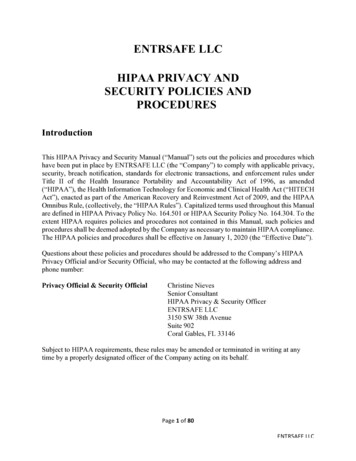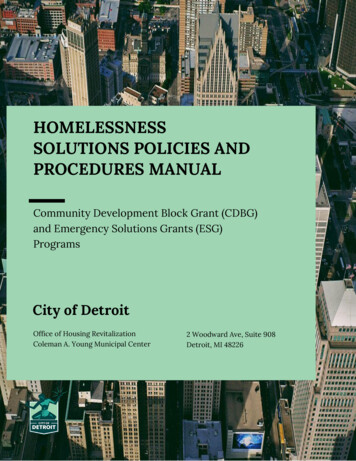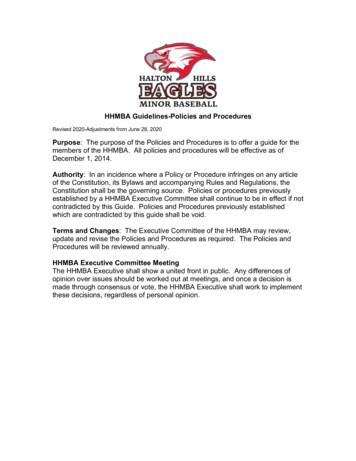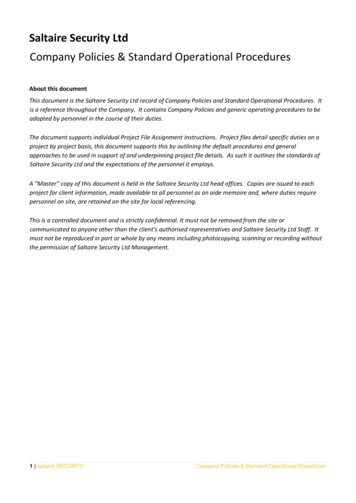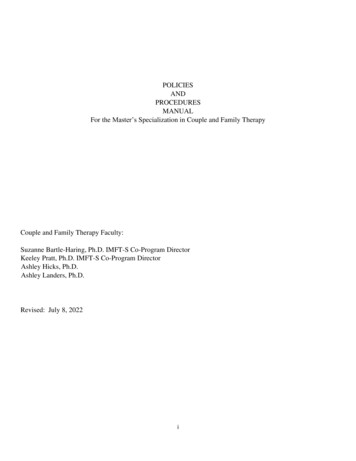
Transcription
POLICIESANDPROCEDURESMANUALFor the Master’s Specialization in Couple and Family TherapyCouple and Family Therapy Faculty:Suzanne Bartle-Haring, Ph.D. IMFT-S Co-Program DirectorKeeley Pratt, Ph.D. IMFT-S Co-Program DirectorAshley Hicks, Ph.D.Ashley Landers, Ph.D.Revised: July 8, 2022i
Table of ContentsLIST OF APPENDICES . ivProgram Mission: . 1PART 1: ACADEMIC TRAINING . 1A. Program Goals . 1Student Learning Outcomes: . 1B. Diversity and Inclusivity Principles and Commitments in the OSU Couple and Family Therapy Programs . 1C. Admissions Policy . 5D. Course Requirements . 6E. Scholarships within Education and Human Ecology . 6F. Program Administration and Governance . 6G. Evaluation . 8H. Policy on the Disclosure of Personal Information . 9I. Clinical Competence Exam . 9J. Master’s Thesis . 10K. Refund Policies . 10L. Student Rights and Responsibilities . 10M. Student Grievance Procedures within the Program. 11N. Nondiscrimination Policy. 11O. Portability of Degree . 11P. Technology Requirements . 12PART II: CLINICAL TRAINING . 12A. Criteria for Eligibility to see Clients in the Clinic . 12B. Clinical Experience Requirements: . 12C. Contact Hours Defined . 121. Alternative Hours . 13D. Supervision . 131. Supervision Requirements Defined . 142. Recording of Therapy and Supervision Hours . 15E. Faculty Evaluation of Students . 15ii
F. Student Evaluation of Faculty: . 16Part III. Couple and Family Therapy Placements . 16A. Criteria for Eligibility to begin Placements . 16B. Placement Experience Requirements . 16C. Policy for the Transport, Storage, and Transmission of Confidential Media. 16D. Evaluation . 17F. Recording Client Contact and Supervision Hours . 17Part IV: Applying for Licensure in Ohio . 17Appendix A. Annual Report and Curriculum . 19Appendix B . 22Student Learning Outcomes: . 22Appendix C . 23Clinical Competency Exam . 23Appendix D. 24Supervisor Evaluation Form . 24Appendix E . 25Sample Placement Contract . 25Appendix F . 27Evaluation of Placement Site . 27Appendix G . 29Attestation Document . 29Appendix H . 30CFT Program Director Evaluation . 30Appendix I . 36CFT Graduates Survey . 36Appendix J . 38Employer/Internship Site Satisfaction . 38iii
LIST OF APPENDICESABCDEFGHCURRICULUM REQUIREMENTSEND OF YEAR REPORTSTUDENT LEARNING OUTCOMES FOR ANNUAL REVIEW LETTERCLINICAL COMPETENCY EXAM REQUIREMENTSSUPERVISOR EVALUATION FORMPROGRAM DIRECTOR/RESOURCES EVALUATIONALUMNI QUESTIONNAIREEMPLOYER SATISFACTION SURVEYiv
COUPLE AND FAMILY THERAPYPROGRAM POLICIES MANUALProgram Mission:To train excellent couple and family therapy clinicians for community mental health and other settings.PART 1: ACADEMIC TRAININGA. Program Goals1. CFT Masters Students will develop clinical skills to enable them to work effectively withindividuals, couples and families.2. CFT Masters Students will develop a theory of change that enables them to work with clients fromdiverse backgrounds.3. CFT Masters Students will be well versed in the ethical conduct of Couple and Family Therapy.Student Learning Outcomes:1. Synthesize conceptual and intervention skills within a developing theory of change, usingrelational/systemic models.2. Know the literature available about diverse families and how diverse families access and engage intreatment.3Understand methods of diagnosis and treatment planning.4. Know the ethical standards for the professional practice of CFT.5. Students will be ready for entry level clinical practice in the field.The educational objectives of the program emphasize clinical training toward licensure in Ohio.B. Diversity and Inclusivity Principles and Commitments in the OSU Couple and FamilyTherapy ProgramsAs a Commission on Accreditation for Marriage and Family Therapy Education accredited programand/or as members of the American Association of Marriage and Family Therapy, we adhere to the codeof ethics for Couple and Family Therapy and the Diversity and Inclusivity Statement published on theAAMFT website (aamft.org). Below we have quoted the statement and made additions and alterationsas we see fit to make it applicable to our programs (in italics).1
“Diversity is a reality of life reflected in the broadest spectrum of the many different ways thatindividuals identify and exist in the world. Inclusion is acknowledging and appreciating the reality andvalue of our diversity, intentionally enlisting and engaging the spectrum of different identities andexperiences, and respecting what each person brings to the program.”“We acknowledge that societal power structures, tensions, and complexities related to diversity, and inparticular, race, contribute to disparities in power, control, influence, status, privilege, and opportunitiesamong individuals and groups. Therefore, our commitment to inclusion involves the continuousidentification and effective elimination of barriers to accessing our educational programs, and ourclinical services.”“It is a core value in our programs to support, promote, and protect diversity, to value all individuals andgroups as free from prejudice and oppression as possible, and to foster a climate where equity andmutual respect are intrinsic.”“By appreciating the importance of inclusion, we acknowledge that the collective and individual talents,skills, and perspectives of our faculty, students, and other communities of interest foster a culture ofbelonging, collaborative practice, innovation, and mutual respect.”“Diversity of thought and inclusion of new ideas and perspectives can help us increase creativity,generate new ideas, enhance problem solving, and increase flexibility, productivity, and effectiveness inour clinical work, educational endeavors, research, and partnerships to serve OSU, Columbus, andOhio.”Our Acknowledgements1) We acknowledge the deep and enduring culture of systemic, institutionalized racism and whitesupremacy in the United States, with origins that lie in the embrace of slavery and took shapeover generations of segregationist legislation and commonplace practices of bias and exclusion.It is implicit, explicit, structural, and effects not only our economic, social, and civic systems, butalso our everyday behaviors. It is an insidious health and social determinant that systemicallydehumanizes the lives of people of color in America.We acknowledge that racism is a public health crisis which has enabled longstanding andhistorical patterns of neglect, abuse, and maltreatment perpetrated on people of color, especiallyBlack Americans. This has led to racial inequities and disparity in economic, housing,educational, and employment opportunities.For Black Americans, systemic racism can be traced back to the beginning of slavery 400 yearsago. For Native Americans, it includes a long history of destroying their cultures and stealingtheir land. Others in America have suffered by being cruelly separated from their families andloved ones by on-going discrimination in our immigration laws. Racism in all its forms needs toend.2
2) We acknowledge that due to heterosexist societal values—those that put down people who arenot heterosexual—individuals who are LGBQ are marginalized, and experience instances ofharassment, prejudice, and discrimination. Love is love, and heterosexism in all its forms needsto end.3) We acknowledge that cisgender norms—agreeing with your gender assigned at birth—andtraditional ideas of gender expression (e.g., women are feminine, men are masculine), lead to themarginalization of those who are transgender or nonbinary, leading to instances of violence anddiscrimination. Transphobia in all its forms needs to end.4) We also acknowledge that traditional gender norms can be harmful to all genders by generatingstereotypical expectations, which mute the emotional experiences of men, doubt the abilities ofwomen, and put-down those who are nonbinary or present as androgynous. Sexism in all itsforms needs to end.5) We acknowledge the hardships that people from low socioeconomic statuses endure, only to bemet with institutional barriers that limit their chances of success. All people are deserving of achance at a better life than the one they were born into. Institutional barriers, that do not “eventhe playing field”, need to be eliminated, starting with equalizing education and increasingresources.6) We acknowledge the hardships of those who are born with learning, emotional, and physicaldifferences, and those harmed in life that resulted in these differences. All people have the rightat an enjoyable life. Barriers that limit this reality need to be broken down, and resourcesencouraging an enjoyable life need to be instilled.7) We acknowledge that race and racial injustices, and other forms of discrimination based onidentifications that depart from the majority are challenging to talk about8) We acknowledge that all members of our CFT programs will be challenged by issues of racism,racial injustices, heterosexist norms, cisgender norms, and all issues described above and areresponsible for monitoring themselves and growing in their ability to confront themselves and dothe work needed to become antiracist and culturally humble.9) We acknowledge that the CFT field and our program faculty and staff are not currentlyrepresentative of the population.10) We acknowledge that injustices are ongoing.Our Commitments1) First and foremost, we are committed to the AAMFT Code of Ethics and do not discriminatebased on race, age, ethnicity, socioeconomic status, disability, gender, health status, religion,national origin, sexual orientation, gender identity or relationship status.2) We are committed to supporting the University’s and the College of Education and HumanEcology’s initiatives in ending racism and becoming more inclusive. We will evaluate ourstatements and ourselves based on these initiatives.3
3) As a collaborative learning community, we are committed to learning how to be morecompetent in working with communities of color, LGBTQ communities, communities withlower SES, communities who are committed to non-monogamous relationships, communitieswith disabilities, among others. We understand that this learning is life-long.4) As a collaborative learning community, we are committed to the value of cultural humility.“Cultural humility, is a process of reflection and lifelong inquiry, involving self-awareness ofpersonal and cultural biases as well as awareness and sensitivity to significant cultural issues ofothers. Core to the process of cultural humility is the individual’s deliberate reflection of her/hisvalues and biases.” 43/5) We are committed to maintaining a climate of safety that requires the protection of diversity andminoritized students, faculty and staff, while including all in decision making.6) We are also committed to providing a climate of safety for students, faculty and staff to do theirown work as they grow in cultural humility.7) We are committed to monitoring and educating ourselves in our efforts to increase ourcompetence and our practice of cultural humility.8) We are committed to be antiracist, and to antiracist practices which we demonstrate in ourteaching, supervision, clinical work and research.9) We are committed to encouraging and valuing feedback from all students and faculty.10) We are committed to courageous conversations about race and racial injustices, and other formsof discrimination based on identifications that depart from the majority.11) We are committed to learning from our mistakes and giving others the opportunity to learn fromtheir mistakes.12) We are committed to holding ourselves and our colleagues accountable for upholding anddemonstrating these commitments.13) We are committed to the development of a diverse workforce including clinicians and faculty.14) We are committed to discussing on-going injustices within the program and to make plans foraddressing these as appropriate.15) We are committed to collaborating with community partners (internship sites, and othercommunity partners) who share a common goal of eliminating systemic racism.16) We are committed to place-based investments in services to support our communities that sufferthe greatest health and economic disparities.4
Accountability1) We will evaluate this statement each year and make changes to it as the need arises.2) We will collect data from students about the faculty and staff’s demonstration of thesecommitments. Feedback from these surveys will be used annually to improve the program andits climate of safety.Action Step: Input from students about the climate of safety questions for the annualsurvey will be gathered.Action Step: New items for the annual survey will be incorporated for Spring 2021 tobetter assess our climate of safety, and this feedback will be used to develop additionalaction steps for academic year 21-22.3) We will evaluate students on their demonstration of our commitments throughout the programand provide timely and specific feedback in addition to their annual reviews.4) We will implement strategies so that all students, especially those who are marginalized, will feelcomfortable providing feedback. These strategies include student representatives for the facultymeetings, anonymous suggestion box, bringing in an outside facilitator for a listening session.Throughout the year, we will demonstrate how this feedback is being used to improve theprogram and its climate of safety.Action Step: In academic year 21-22 we will invite a speaker to present antiracist strategiesin clinical work that all faculty and students will be required to attend. We will invitespeakers on topics of diversity and inclusion each academic year moving forward.5) Any acts of racism or prejudice will not be tolerated at any level. We understand that thosetargeted by such heinous acts may not initially feel safe or comfortable with taking action againstoffenders. The university has established the Bias Assessment and Response Team (BART)reporting system for victims and bystanders/witnesses, located here .6) When members of the CFT program (faculty, students, staff) are consistently lacking in theirdemonstration of our commitments, a remediation plan will be put in place according to theUniversity’s policies and procedures.C. Admissions PolicyTo be admitted in to the CFT Master’s Program, students must hold a bachelor’s degree with a 3.0 GPA.Above and beyond that, the CFT program requires an admissions interview in which the student meetswith all CFT faculty. In this interview students will be asked to discuss their clinical interests, andexperience and will be evaluated on their interpersonal skills.5
D. Course RequirementsStudents in this program complete the education requirements put forth by the Ohio Counselor, SocialWorker, & Marriage and Family Therapist Board. This also aligns with the accreditation standards forthe Commission on Accreditation for Marriage and Family Therapy Education. The list of courses ineach of these categories is presented in Appendix A. The program is designed to be completed in 5 fulltime semesters including one summer semester. Part-time options are available and designed to meetstudent needs and faculty availability. Clinical work begins in the 2nd full-time semester and continuesthrough the summer semester and the following academic year. If students have not completed theirclient contact hours by the end of the their 2nd Spring semester, they may enroll for additional credits andcomplete their client contact hours in the summer semester.E. Scholarships within Education and Human EcologyAll graduate students are encouraged to complete the EHE Graduate Student scholarship applicationthat is available on the EHE Scholarships webpage. (https://ehe.osu.edu/scholarships/) Once theapplications are submitted the applications are reviewed and recipients are selected by the HumanSciences graduate student scholarship committee. The committee chair is Department Chair ErikPorfeli and the co-chair was Sue Sutherland.The scholarship applications will be available for all groups starting October 1st and the deadlines arelisted below. oThe deadlines for awarding cycles may change, please inquire:Graduate students, both enrolled and prospective students: March 1stCompletion of the EHE graduate student scholarship application is necessary for students to beconsidered for all of the available scholarships they may be eligible to receive. Currently there are twoscholarship funds for HDFS graduate students in particular, the Florence Levy Miller and I. GeorgeMiller Memorial scholarship fund (fund# 204987) and the Jennifer Sedgwick Endowment fund (fund#206454). There are approximately 13 scholarship funds that are for graduate students in HumanSciences in general – and not targeted to one degree program.F. Program Administration and Governance6
Core Faculty: The CFT program has four full-time faculty members, Suzanne Bartle-Haring,Keeley Pratt, Ashley Landers, and Ashley Hicks. All faculty teach courses in the requiredcurriculum and provide supervision to the students in the program. Each faculty member alsofulfills administrative roles.Co- Director, Suzanne Bartle-Haring, who oversees the operation of the CFT program. Her job is toserve as a liaison with the Commission on Accreditation for Marriage and Family Therapy Education(COAMFTE), recruit prospective students, oversee the evaluation processes within the program (Pleasesee Evaluation Section F for further details), and maintains accreditation standards. She maintains andmonitors the Time2Track data for student client contact hours and supervision hours, holds monthlyCFT faculty meetings, with student representatives, holds 3 program wide meetings annually,coordinates with the Clinic Director to ensure students are obtaining the client contact hours needed,helps with the clinic budget and expenditures, revises policies and procedures manuals for both theMaster’s and Ph.D. programs, and distributes the results of the evaluation surveys for the annualprogram evaluation meeting. She also teaches classes and supervises in both the master’s and Ph.D.program.Co- Director, Keeley Pratt, also oversees the operation of the CFT program. Her job is to provide anorientation to all incoming students, be available to students in the program for any concerns andfeedback, hold monthly CFT faculty meetings, hold 3 program wide meetings annually, hold the annualprogram evaluation meeting, and serves as liaison with the HDFS Graduate Studies committee forcurriculum decisions and admissions.The Clinic Director is Ashley Hicks. The Clinic Director oversees the activities of the Ohio StateUniversity Couple and Family Therapy Clinic, here on campus in Bevis Hall. She is responsible forassigning clients, overseeing supervision at the clinic, maintaining all equipment at the clinic, managingall student assistants, overseeing fee collection and creating a budget for the clinic annually. Sheteaches classes and supervises in both the master’s and Ph.D. program.Placement/Internship Coordinator, Ashley Landers, manages internship sites for the doctoral internshipprogram and maintains the internship contracts for the program which can include clinical, teaching andresearch foci. She also oversees placement sites for the master’s program. She teaches classes in theMaster’s and Ph.D curriculums, and provides clinical supervision.Supervisors: There may be times when the number of students in the program require moresupervisors than the three core faculty. This is determined by the state licensure boards ratio of 1supervisor for every 8 students in group supervision, and the amount of time each core facultymember has to provide supervision given their teaching load and service duties. When supervisorsare hired their qualifications are reviewed by the faculty and preference is for AAMFT ApprovedSupervisors and/or state supervisors in order to provide students with the supervision they need forlicensure requirements in the state. Supervisory sufficiency is reviewed annually for the comingyear based on the 1 to 8 ratio of supervisor to students.7
G. Evaluation1. Student EvaluationSince the program aims to produce excellent clinicians, students will be evaluated on their clinical workas well as in their academic work. These areas do not always go together. Some students exhibitexcellent academic skills, but do not excel in clinical work. Others have excellent clinical skills and donot excel in academic work. Students’ academic performance will be evaluated throughout theirtraining in the form of grades for course work completed. The Counseling, Social Work, and Marriageand Family Therapist Licensing Board in the state of Ohio requires a B or better in all course work inorder for the course to be counted toward your degree. In addition, students will receive feedback fromthe CFT faculty at the end of each year concerning their academic progress. Appendix A contains theend of the year report that master’s students the program are required to submit. This includes anevaluation of the courses taken and grades obtained. If academic progress is not satisfactory, studentswill be notified in writing and asked to meet with the CFT faculty and submit a plan for improvedprogress. If sufficient progress is not made the following academic year, individuals may be advised outof the CFT program or encouraged to take a leave of absence if extenuating circumstances exist.Students will also be evaluated on the Student Learning Outcomes annually and receive that evaluationwith their end of the year letter from the CFT faculty. This form can be found in Appendix C. Theprogram uses this form to chart individual student progress and also aggregates the information annuallyby cohort (year of admission to the program) to evaluate the program.Evaluation of clinical training takes place each semester. Students will also complete a clinicalcompetency exam. Please see Evaluation sections in the Clinical Training part of this document.2. Program Directors’ EvaluationThe program directors will be evaluated annually in May each year. The anonymous program directorsevaluation is conducted through the Qualtrics Survey System. The evaluation of the program directorsre
1. CFT Masters Students will develop clinical skills to enable them to work effectively with individuals, couples and families. 2. CFT Masters Students will develop a theory of change that enables them to work with clients from diverse backgrounds. 3. CFT Masters Students will be well versed in the ethical conduct of Couple and Family Therapy.







